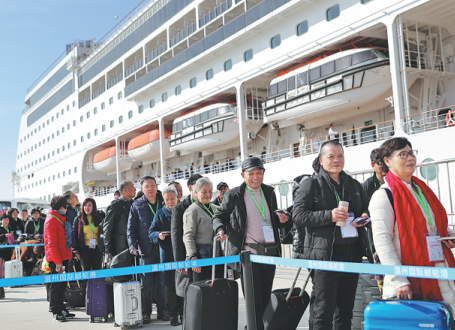
You could be forgiven for thinking that elderly people are not tech savvy and that they do not have much of an idea about the digital world, but you would be mistaken.
Growing numbers of elderly people are actively embracing the digital world as the digital-savvy silver-haired economy is booming in China.
Among Chinese mobile internet users, more than 50 million are seniors aged 50 and above, according to a report released by internet services provider QuestMobile.
"New content, connections and lifestyles have popped up, buoyed by rapidly changing technologies," said Cheng Wu, vice-president of Chinese internet giant Tencent Holdings.
"In modern society, the internet and digital technologies are tools that can convey and carry emotion. After retirement, seniors lack a proper social space. The internet can open a new world for them."
Today’s Story in the Story looks at how the digital-savvy silver-haired economy is booming in China as Internet tech changes senior people's social lives, shopping and interests.

Elderly tourists prepare to board a cruise ship in Wenzhou, Zhejiang province. (Photo: China Daily)
According to the Office of the National Working Commission on Aging, there were 241 million people aged 60 and above in China at the end of 2017, accounting for 17.3 percent of the total population.
That number is expected to hit 487 million by 2050, or 34.9 percent of the total population.
QuestMobile noted in its report that as a large group of people born in the 1960s and 1970s, who received better education than previous generations, are turning 50, we will see a higher literacy rate among retirees.
Statistics from QuestMobile showed seniors tend to spend their time on Tencent's WeChat instant messaging app, watching short videos and reading news apps.
In China, elderly people are increasingly making WeChat a part of their life. As of September 2018, WeChat had 61 million users aged between 55 to 70, the company claimed.
"The booming internet technologies will help to create a new digital lifestyle for middle-aged and elderly people," said Chen Guangjin, director of the Institute of Sociology at the Chinese Academy of Social Sciences.
"The blossoming mobile internet is changing the way they interact with others, acquire information and spend their leisure time," Chen said.
As an increasing number of middle-aged people and seniors are taking their familiarity with technology from the workplace with them into retirement, many have started shopping online, including on Taobao and JD, two leading Chinese e-commerce sites.
As of October 2018, Alibaba's Taobao and Tmall platforms had nearly 30 million middle-aged and elderly online shoppers, the company claimed.
Alibaba's statistics said the average spend among online shoppers aged over 50 hit nearly 5,000 yuan ($730) in the first nine months of 2018. The average number of purchased goods in the group was 44 items, highlighting their high purchasing power.
"The vast elderly group is gradually becoming a new market force in the age of the internet. So now we need to have a better understanding of individual differences among seniors to better serve their specific needs," said Si Xiao, head of the Tencent Research Institute.
And it doesn’t stop there.
Fan and his wife take a selfie at home. (Photo: Xinhua)
More Chinese retirees are increasingly using online booking sites to plan their trips, with leading online travel company Ctrip finding 54 percent of the age group preferring to use online travel platforms.
A wide range of new products have emerged in recent years, including customized trips, themed tours, private tours and cruise trips.
According to Ctrip, travelers aged above 55 accounted for 16 percent of people booking such customized trips last year, with the average spend hitting 3,500 yuan.
The country's aging population will bring new opportunities for the market, and an increasing proportion of consumers will prefer to purchase high-quality products and services, noted Wang Bin, co-founder and president of venture capital and technology-focused media platform iyiou.com.
Older Chinese people traveled to 74 countries in 2018, according to a report by Ctrip. Among senior travelers, 24 percent chose to travel for more than seven days, compared to 19 percent in 2016.
"Today, seniors have new requirements, and we need to update the offerings accordingly," the report noted.
Compared with younger tourists, seniors are willing to spend more money on their vacations. People born in the 1950s have become the biggest spenders, with the average spend on a packaged tour reaching 3,115 yuan ($456) in 2018.
For instance, senior travelers from Shanghai spent 4,989 yuan last year on average for packaged trips, up by 11 percent year-on-year.
(Produced by Nancy Yan Xu, Brian Lowe, Lance Crayon, and Da Hang. Music by: bensound.com. Text from China Daily)


